When I first started my production business I was looking for a regular film gig that would be simple and consistent. I was a rookie and needed to pay rent! As the real estate market was starting to return in Seattle, I thought – how cool would it be to promote higher end properties with a lifestyle video? A broker could use the film to show the property to potential clients not located in the immediate area. And thus, an idea was born…
I partnered with a
Sotheby’s brokerage in Seattle and shot a few short films for their properties and some pieces to help promote the area. And then the day finally came when Sotheby’s was picked to represent a new restoration development in Seattle, the
Homes at Fort Lawton. This project was going to need a larger scale marketing film. We had been given the task to create a piece that not only showcased the lifestyle of the area but also gave a detailed view of the location of the development.
This is how we prepped and shot the film from start to finish.
Pre-Production
When shooting a Real Estate Film the first thing that needs to be done is to scout the property and figure out what features are going to sell it. It might be the home itself, the location, the amenities, the history, etc. With Fort Lawton specifically, what really impacted the sale of the remodeled homes was that it is located in a large area of forested waterfront called Discovery Park, central to the city of Seattle. Something that’s unheard of in today’s real estate market. With that, we knew immediately that focusing on the park, in the most beautiful way possible, was going to be the most important part of the film.
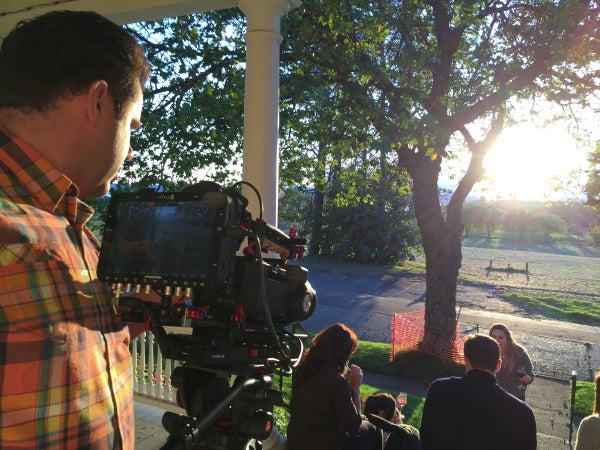
Once we finished scouting our location the next step was to select the crew. Since this was going to be a full production real estate project we first hired a family from a local modeling agency. I decided to bring along one of my producers and an AC to make sure we could complete the shooting in two days.
Following the crew assignments we went ahead and created a shot list with our client to make sure that we agreed on the property highlights that would be included in the final piece. This is by far the most important part of the pre-production process. We had to make sure we highlighted the property in the correct way while also capturing the best imagery possible. Once the shot list was complete we went ahead and put together all of our gear and made all of the arrangements for the following week.
Below is a list of the equipment we used to create the film:
Shooting Days
For any real estate project that we do involving models we usually take two days to shoot. The first day I go out solo with just my drone pilot, Anders Svensson and shoot all of the b-roll needed for the film. This gets me familiar with the property. In the case of Fort Lawton we needed to shoot the interior of the model home, the park, the neighborhood, and some scenic beach shots.
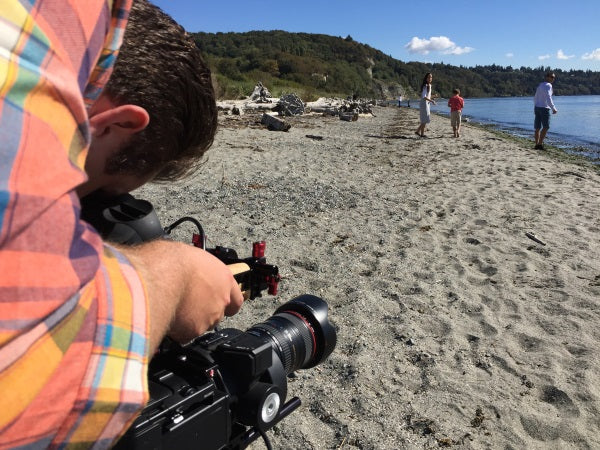
After we completed our b-roll shooting, day two at Fort Lawton is when the models came in for the lifestyle section of the film. Working with models for a full day of shooting can sometimes be draining. I have learned a few things along the way that I think can be really helpful to keep everybody fresh and make sure I get the most value out of my day of filming.
1. Work clean
One thing I cannot stress enough when shooting a real estate video is too make sure that the home or development is staged properly and cleaned with the utmost attention to detail. I have made the mistake of not checking the property a couple days before we start filming. Making sure that everything is in place and clean will in turn make the film look intentional and polished. This rule really applies to any job.
2. Have a producer
Having someone to work with the models and let them know where to be and when takes the stress off me and lets me focus on getting the best shots. Our Fort Lawton producer, Selina, nailed it on this part of the shoot by making sure the kids were happy and mom and dad had everything they needed.
3. Bring lots of food and drink
Nobody likes working when they’re hungry so have lots of water and healthy snacks ready to go when the blood sugar drops.
4. Take breaks
Making sure your models have a chance to regroup a few times a day keeps everybody in a good mood. If I’m setting up a shot, the producer makes sure that the models are on break.
5. Keep your stress to yourself
Stress is contagious. In my experience, the second that people I am working with can see I am stressed they loose confidence in my ability to get the job done. So in situations where timing gets tight or you’re not getting the shot for some reason, take a breath and keep that smile on your face; it goes a long way.
Lighting
We started with an early call time in order to film at first light. Lighting is very important when shooting the interior of a home. Unless you are shooting HDR video, there is a very small window of time when you can get the natural light outside to match the lighting inside. One way to do this is to blow out the interior of the house with external lighting. The second way is to shoot right after sunrise and before or after sunset. I tend to go the latter, if possible, as the look of over lightning an interior looks a bit fake to me. So I use a camera with a lot of dynamic range and shoot at the appropriate times to make sure the interior of the home is well lit and the windows are not blown out.
Interior
For most real estate videos we usually pick the best parts of the interior of the home to shoot. A common mistake made is to show shots of every bedroom, bathroom, and closet in the house; that is what photos are for. Our goal here is to tell a compelling story and show the highlights of the home in a way that will visually entice someone enough to pick up the phone and call the broker. Once a viewer gets bored watching a video and interest is lost, it’s on to the next listing.
Exterior
Once we've finished filming the interior we move to the outside activities that we're going to use to feature the park and the surroundings of the homes. Our goal here is to showcase the family enjoying everything the park had to offer while making it look like daily life. The outdoor setting is where we really needed to get great footage as it was the key selling point of the development.
 For our last shot of the day we wanted to promote the community aspect of the neighborhood. To do so we captured everybody involved in the shoot along with a few extra brokers and watched the sunset from one of the homes at the top of neighborhood. The strategy behind this was meant to leave viewers with a sense of community and potential friendship that one could have if purchasing a home in Fort Lawton. Brokers today will tell you that this is just as important as the actual house and a very important feeling that the video needed to communicate.
For our last shot of the day we wanted to promote the community aspect of the neighborhood. To do so we captured everybody involved in the shoot along with a few extra brokers and watched the sunset from one of the homes at the top of neighborhood. The strategy behind this was meant to leave viewers with a sense of community and potential friendship that one could have if purchasing a home in Fort Lawton. Brokers today will tell you that this is just as important as the actual house and a very important feeling that the video needed to communicate.

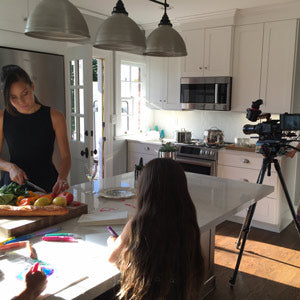
 Once we finished scouting our location the next step was to select the crew. Since this was going to be a full production real estate project we first hired a family from a local modeling agency. I decided to bring along one of my producers and an AC to make sure we could complete the shooting in two days.
Following the crew assignments we went ahead and created a shot list with our client to make sure that we agreed on the property highlights that would be included in the final piece. This is by far the most important part of the pre-production process. We had to make sure we highlighted the property in the correct way while also capturing the best imagery possible. Once the shot list was complete we went ahead and put together all of our gear and made all of the arrangements for the following week.
Below is a list of the equipment we used to create the film:
Once we finished scouting our location the next step was to select the crew. Since this was going to be a full production real estate project we first hired a family from a local modeling agency. I decided to bring along one of my producers and an AC to make sure we could complete the shooting in two days.
Following the crew assignments we went ahead and created a shot list with our client to make sure that we agreed on the property highlights that would be included in the final piece. This is by far the most important part of the pre-production process. We had to make sure we highlighted the property in the correct way while also capturing the best imagery possible. Once the shot list was complete we went ahead and put together all of our gear and made all of the arrangements for the following week.
Below is a list of the equipment we used to create the film:
 After we completed our b-roll shooting, day two at Fort Lawton is when the models came in for the lifestyle section of the film. Working with models for a full day of shooting can sometimes be draining. I have learned a few things along the way that I think can be really helpful to keep everybody fresh and make sure I get the most value out of my day of filming.
1. Work clean
One thing I cannot stress enough when shooting a real estate video is too make sure that the home or development is staged properly and cleaned with the utmost attention to detail. I have made the mistake of not checking the property a couple days before we start filming. Making sure that everything is in place and clean will in turn make the film look intentional and polished. This rule really applies to any job.
2. Have a producer
Having someone to work with the models and let them know where to be and when takes the stress off me and lets me focus on getting the best shots. Our Fort Lawton producer, Selina, nailed it on this part of the shoot by making sure the kids were happy and mom and dad had everything they needed.
3. Bring lots of food and drink
Nobody likes working when they’re hungry so have lots of water and healthy snacks ready to go when the blood sugar drops.
4. Take breaks
Making sure your models have a chance to regroup a few times a day keeps everybody in a good mood. If I’m setting up a shot, the producer makes sure that the models are on break.
5. Keep your stress to yourself
Stress is contagious. In my experience, the second that people I am working with can see I am stressed they loose confidence in my ability to get the job done. So in situations where timing gets tight or you’re not getting the shot for some reason, take a breath and keep that smile on your face; it goes a long way.
After we completed our b-roll shooting, day two at Fort Lawton is when the models came in for the lifestyle section of the film. Working with models for a full day of shooting can sometimes be draining. I have learned a few things along the way that I think can be really helpful to keep everybody fresh and make sure I get the most value out of my day of filming.
1. Work clean
One thing I cannot stress enough when shooting a real estate video is too make sure that the home or development is staged properly and cleaned with the utmost attention to detail. I have made the mistake of not checking the property a couple days before we start filming. Making sure that everything is in place and clean will in turn make the film look intentional and polished. This rule really applies to any job.
2. Have a producer
Having someone to work with the models and let them know where to be and when takes the stress off me and lets me focus on getting the best shots. Our Fort Lawton producer, Selina, nailed it on this part of the shoot by making sure the kids were happy and mom and dad had everything they needed.
3. Bring lots of food and drink
Nobody likes working when they’re hungry so have lots of water and healthy snacks ready to go when the blood sugar drops.
4. Take breaks
Making sure your models have a chance to regroup a few times a day keeps everybody in a good mood. If I’m setting up a shot, the producer makes sure that the models are on break.
5. Keep your stress to yourself
Stress is contagious. In my experience, the second that people I am working with can see I am stressed they loose confidence in my ability to get the job done. So in situations where timing gets tight or you’re not getting the shot for some reason, take a breath and keep that smile on your face; it goes a long way.
 For our last shot of the day we wanted to promote the community aspect of the neighborhood. To do so we captured everybody involved in the shoot along with a few extra brokers and watched the sunset from one of the homes at the top of neighborhood. The strategy behind this was meant to leave viewers with a sense of community and potential friendship that one could have if purchasing a home in Fort Lawton. Brokers today will tell you that this is just as important as the actual house and a very important feeling that the video needed to communicate.
For our last shot of the day we wanted to promote the community aspect of the neighborhood. To do so we captured everybody involved in the shoot along with a few extra brokers and watched the sunset from one of the homes at the top of neighborhood. The strategy behind this was meant to leave viewers with a sense of community and potential friendship that one could have if purchasing a home in Fort Lawton. Brokers today will tell you that this is just as important as the actual house and a very important feeling that the video needed to communicate.

 Once we finished scouting our location the next step was to select the crew. Since this was going to be a full production real estate project we first hired a family from a local modeling agency. I decided to bring along one of my producers and an AC to make sure we could complete the shooting in two days.
Following the crew assignments we went ahead and created a shot list with our client to make sure that we agreed on the property highlights that would be included in the final piece. This is by far the most important part of the pre-production process. We had to make sure we highlighted the property in the correct way while also capturing the best imagery possible. Once the shot list was complete we went ahead and put together all of our gear and made all of the arrangements for the following week.
Below is a list of the equipment we used to create the film:
Once we finished scouting our location the next step was to select the crew. Since this was going to be a full production real estate project we first hired a family from a local modeling agency. I decided to bring along one of my producers and an AC to make sure we could complete the shooting in two days.
Following the crew assignments we went ahead and created a shot list with our client to make sure that we agreed on the property highlights that would be included in the final piece. This is by far the most important part of the pre-production process. We had to make sure we highlighted the property in the correct way while also capturing the best imagery possible. Once the shot list was complete we went ahead and put together all of our gear and made all of the arrangements for the following week.
Below is a list of the equipment we used to create the film:
 After we completed our b-roll shooting, day two at Fort Lawton is when the models came in for the lifestyle section of the film. Working with models for a full day of shooting can sometimes be draining. I have learned a few things along the way that I think can be really helpful to keep everybody fresh and make sure I get the most value out of my day of filming.
1. Work clean
One thing I cannot stress enough when shooting a real estate video is too make sure that the home or development is staged properly and cleaned with the utmost attention to detail. I have made the mistake of not checking the property a couple days before we start filming. Making sure that everything is in place and clean will in turn make the film look intentional and polished. This rule really applies to any job.
2. Have a producer
Having someone to work with the models and let them know where to be and when takes the stress off me and lets me focus on getting the best shots. Our Fort Lawton producer, Selina, nailed it on this part of the shoot by making sure the kids were happy and mom and dad had everything they needed.
3. Bring lots of food and drink
Nobody likes working when they’re hungry so have lots of water and healthy snacks ready to go when the blood sugar drops.
4. Take breaks
Making sure your models have a chance to regroup a few times a day keeps everybody in a good mood. If I’m setting up a shot, the producer makes sure that the models are on break.
5. Keep your stress to yourself
Stress is contagious. In my experience, the second that people I am working with can see I am stressed they loose confidence in my ability to get the job done. So in situations where timing gets tight or you’re not getting the shot for some reason, take a breath and keep that smile on your face; it goes a long way.
After we completed our b-roll shooting, day two at Fort Lawton is when the models came in for the lifestyle section of the film. Working with models for a full day of shooting can sometimes be draining. I have learned a few things along the way that I think can be really helpful to keep everybody fresh and make sure I get the most value out of my day of filming.
1. Work clean
One thing I cannot stress enough when shooting a real estate video is too make sure that the home or development is staged properly and cleaned with the utmost attention to detail. I have made the mistake of not checking the property a couple days before we start filming. Making sure that everything is in place and clean will in turn make the film look intentional and polished. This rule really applies to any job.
2. Have a producer
Having someone to work with the models and let them know where to be and when takes the stress off me and lets me focus on getting the best shots. Our Fort Lawton producer, Selina, nailed it on this part of the shoot by making sure the kids were happy and mom and dad had everything they needed.
3. Bring lots of food and drink
Nobody likes working when they’re hungry so have lots of water and healthy snacks ready to go when the blood sugar drops.
4. Take breaks
Making sure your models have a chance to regroup a few times a day keeps everybody in a good mood. If I’m setting up a shot, the producer makes sure that the models are on break.
5. Keep your stress to yourself
Stress is contagious. In my experience, the second that people I am working with can see I am stressed they loose confidence in my ability to get the job done. So in situations where timing gets tight or you’re not getting the shot for some reason, take a breath and keep that smile on your face; it goes a long way.
 For our last shot of the day we wanted to promote the community aspect of the neighborhood. To do so we captured everybody involved in the shoot along with a few extra brokers and watched the sunset from one of the homes at the top of neighborhood. The strategy behind this was meant to leave viewers with a sense of community and potential friendship that one could have if purchasing a home in Fort Lawton. Brokers today will tell you that this is just as important as the actual house and a very important feeling that the video needed to communicate.
For our last shot of the day we wanted to promote the community aspect of the neighborhood. To do so we captured everybody involved in the shoot along with a few extra brokers and watched the sunset from one of the homes at the top of neighborhood. The strategy behind this was meant to leave viewers with a sense of community and potential friendship that one could have if purchasing a home in Fort Lawton. Brokers today will tell you that this is just as important as the actual house and a very important feeling that the video needed to communicate.

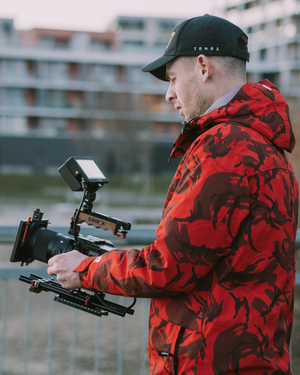
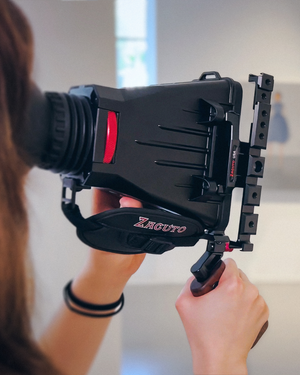
Leave a comment